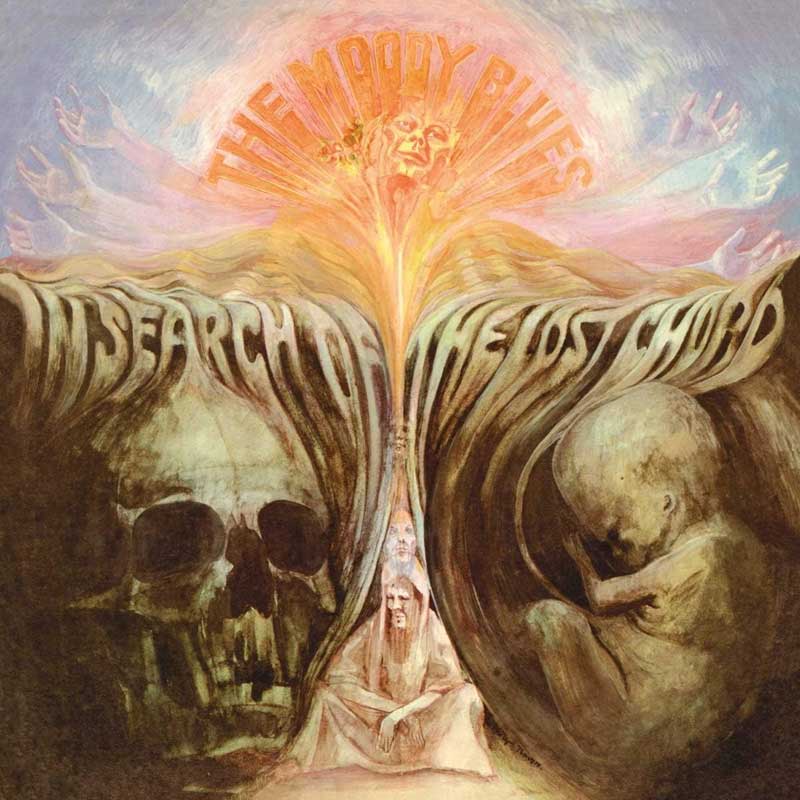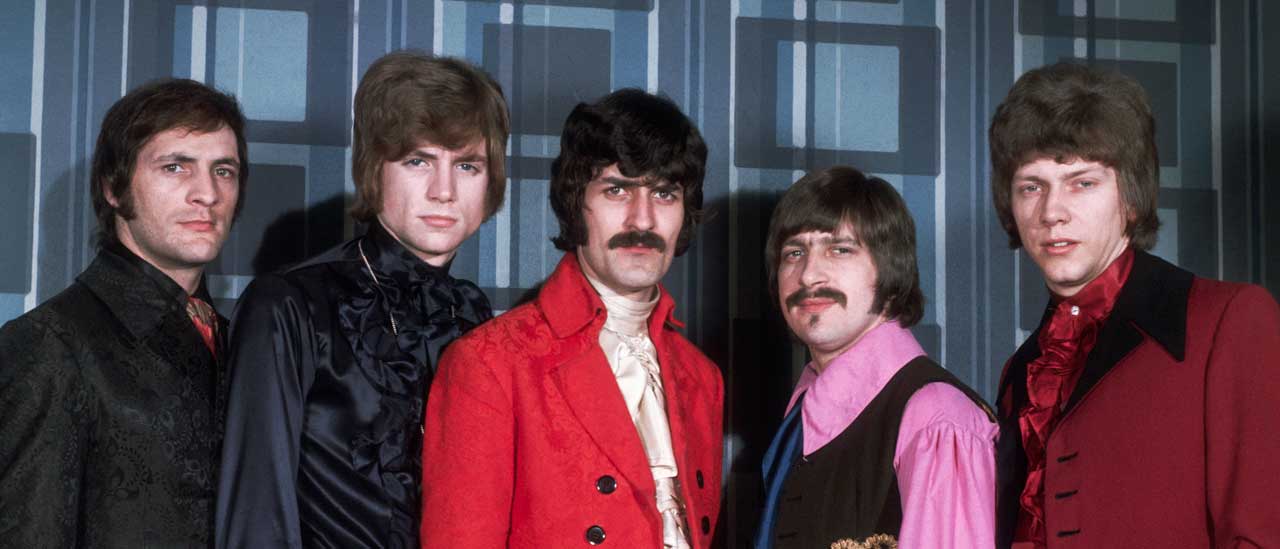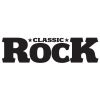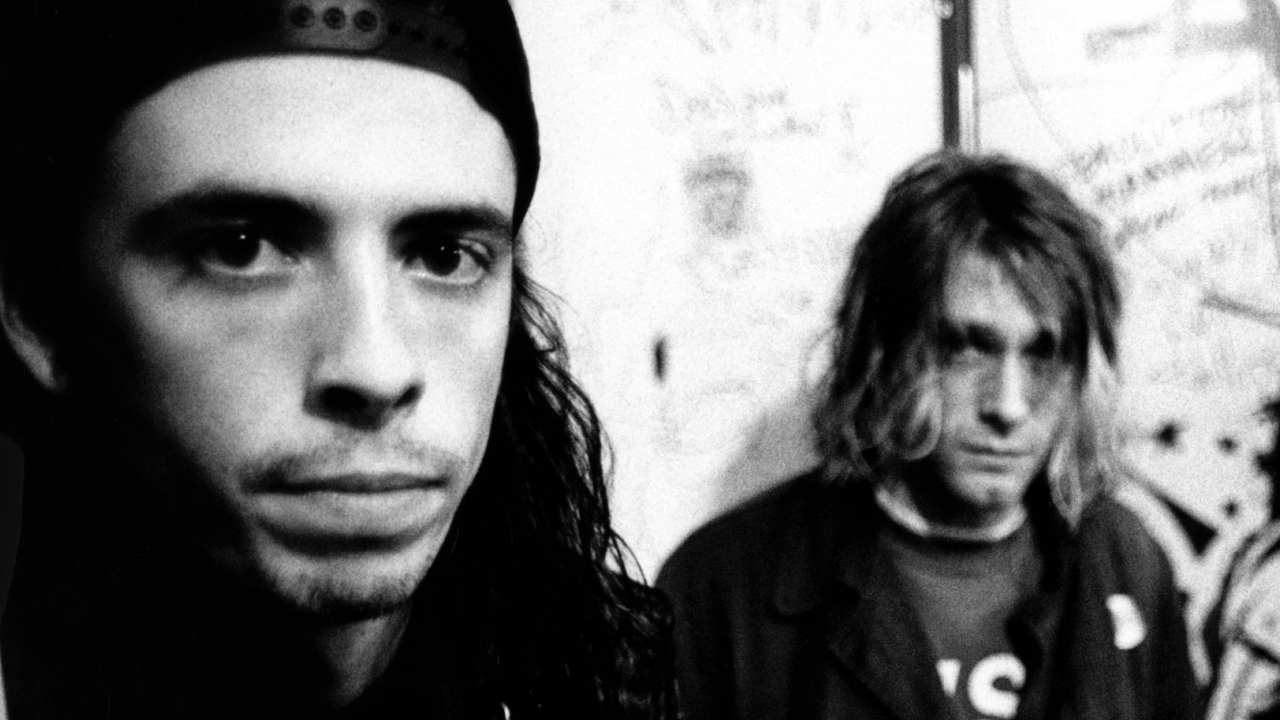You can trust Louder

Departure
Ride My See-Saw
Dr. Livingstone, I Presume
House Of Four Doors
Legend Of A Mind
House Of Four Doors (Part 2)
Voices In The Sky
The Best Way To Travel
Visions Of Paradise
The Actor
The Word
Om
A disarmingly trippy delight that had the band hoisting their freak flag into the warm psychedelic breeze of the times. LSD had entered the Moody Blues’ lives, bringing with it a sense of experimentation that sought to emulate The Beatles’ spiritual and creative enlightenment.
Cue songs about space, higher consciousness, philosophy, and the counterculture’s own antihero Timothy Leary as the subject of Thomas’s fittingly lysergic Legend Of A Mind. They’d expanded their creative palette too, with sitar, tabla and tambura adding exotic spice to Pinder’s Mellotron textures, a move that was particularly successful on the epic House Of Four Doors – Part One. Disappointingly, the lost chord turns out to be Om, which is chanted to an accompaniment of Indian instruments.
"We decided that we’d play all the instruments ourselves,” the late John Lodge told Classic Rock. “We went out and bought French horns and sitars and oboes and then we bought the Play In A Day books. I bought a cello. I used it for two albums before I realised that it’s not tuned the same way as a bass guitar.”

Every week, Album of the Week Club listens to and discusses the album in question, votes on how good it is, and publishes our findings, with the aim of giving people reliable reviews and the wider rock community the chance to contribute.
Other albums released in July 1968
- Music from Big Pink - The Band
- Waiting for the Sun - The Doors
- My People Were Fair and Had Sky in Their Hair... - Tyrannosaurus Rex
- Shades of Deep Purple - Deep Purple
- Anthem of the Sun - Grateful Dead
- Music in a Doll's House - Family
- Super Session - Mike Bloomfield/Al Kooper/Stephen Stills
- Truth - The Jeff Beck Group
- Creedence Clearwater Revival - Creedence Clearwater Revival
- Undead - Ten Years After
- Getting to the Point - Savoy Brown
- So Fine - Ike & Tina Turner
What they said...
"They dumped the orchestra this time out in favour of Mike Pinder's Mellotron, which was a more than adequate substitute, and the rest of the band joined in with flutes, sitar, tablas, and cellos, the playing of which was mostly learned on the spot. The whole album was one big experiment to see how far the group could go with any instruments they could find, thus making this album a rather close cousin to the Beatles' records of the same era." (AllMusic)
"Overall, it’s hard to detect if the group are wryly mocking or spryly rocking the ‘hippy-dippy heavy, maaan’ aspects of the end of the 1960s that has now become go-to shorthand for media-historicising. There’s an almost religious anti-religiosity throughout, more a devotion to pure emotion that will reward the true seeker." (MusicNews.com)
"Their writing is not consistently imaginative, but it is not especially derivative either; the singing is consistently good, and the arrangements are effectively executed with little reliance on studio musicians. Hopefully next time around the Moody Blues will leave their London Festival Orchestra and Yantra at home and get together a straight-ahead, no bullshit album of rock." (Rolling Stone)
What you said...
Evan Sanders: I've been a fan of the Moody Blues since hearing them non-stop at my aunt and uncle's house, both children of the 60s. And the troubling part for me is that besides Days Of Future Passed and Long Distance Voyager, their albums all seem to follow a pattern of two or three strong singles supplemented by simply average songs that set a trippy mood.
In Search Of The Lost Chord is in that category, with the strong songs of Ride My See Saw, Legend Of A Mind (Timothy Leary's), and Voices in the Sky. I've been told that they were amazing in concert, and any of their compilation albums deserve multiple plays. It will probably be a long time before I listen to this album from start to finish again, although the Moody Blues will always remain on my playlist. 6 or 7 out of 10.
Martin Roberts: It has a very late 60s West Coast Beach Boys feel mixed with quirky British lyrics of the Small Faces or the Kinks I really liked the opening Departure. Dr Livingstone, I Presume is an example of the quirky and very British lyrics. The end of Legend Of The Mind reminded me of The Verve. I liked Om, with its Indian feel. Overall, a 6 out of 10 for me as nothing stood out.
Shane Reho: RIP John Lodge. Following up a classic like Days of Future Passed couldn't have seemed like an easy task for the Moody Blues in 1968. Lucky for all of us listeners (being born in 2000, do I count?), they had six more classics up their sleeves through 1972, and another in 1981.
In some ways, this album might be more accomplished than Days, as each member is credited with at least three instruments played, and they do. It's also perhaps their most adventurous. Overall, I'd grade this a 9/10, as not every track is an absolute classic, and a few don't really work outside of the album's context. However, John Lodge's Ride My See Saw and Ray Thomas' Legend Of A Mind are probably the best overall. While I don't know where to add it in the tracklist, and hate to knock the album as is, it's unfortunate that Mike Pinder's A Simple Game was relegated to a B-side. It deserved a place on the LP.
Jon Peacock: As someone who never listens to the Moody Blues, I bit the bullet and went with it on this album suggestion.
Well, I think I may be a new convert, certainly to this album. Much better than I anticipated. I suppose I was expecting something similar to the Moody’s singles output, but no, this is more listenable; great harmonies, great songwriting, and for a light progressive band, much more accessible.
Moody Blues, you got me. Definitely on my vinyl purchase list. I suppose I’ll have to try a few more albums as well. 8/10.
Gary Claydon: Polite psychedelia. Typical Moody's groping around in any and every bit of 60s spirituality and mysticism they could find, without ever doing more than scratching the surface. Somewhat pretentious (not to mention inane) lyrically, best to ignore them altogether and just listen to the, admittedly, often soothing music (I especially like Mike Pinder's mellotron ). When The Moody Blues were good, they were very good, but there isn't much of that in evidence here.
Greg Schwepe: Early prog at its finest with all the hallmark characteristics; a little mellotron, flute (the style I like!), harpsichord, lush harmonies, strings, dreamy cascading keyboards, fingerstyle acoustic guitar… it’s all here.
In Search Of The Lost Chord could be one of a few starting points if someone asked, “What should I listen to first if I wanted to check out The Moody Blues?” Very much representative of their style over the years. You could point someone here, and it seems to say, “Yep, this is what The Moody Blues are all about.” End of story.
Also, there is something about the instrumentation and songwriting that seems to take you on a journey (maybe in search of that lost chord?). As you listen, you find yourself listening intently, but also find yourself wandering as you lose yourself in the songs.
If you had to measure a guess as to when this was made, you’d easily say “hmmm…I’m gonna say…the late 60’s!” With the spoken word segue The Word, making that guess an easy one. The trippy Om follows and is another “Yup, that’s the 60’s for you” song. Oh, and the ode to the trippy hippie Timothy Leary in Legend Of A Mind totally seals it.
This is a prime example of the genre. 7 out of 10 on this one for me. Best listened to on real headphones, not earbuds for the full immersive experience.
Mike Canoe: When I came of musical age in the '80s in north Texas, you were far more likely to hear Moody Blues songs like Gemini Dream or The Voice on the radio than anything from their glory days in the late '60s/early '70s, except for maybe an occasional airing of Nights in White Satin or I'm Just a Singer... on the oldies station.
I can appreciate their classic stuff like In Search Of The Lost Chord much better now than when I was in my early teens. Legend Of The Mind and Om are little masterpieces with beautiful melodies and exquisite vocal harmonies. Still, with the possible exception of Ride My See-Saw, the album can hardly be accused of rocking too hard.
The waggish side of me thinks the "lost chord" they were searching for may have been a power chord, but I also liked the album enough that I'll check out their classic run of albums from '67 to '72.
James Last: While they are a great and undeniably important band, no Moody Blues album comes close to perfect. The singles tended to be the best tracks on the album, and they are almost always Justin Hayward or John Lodge-penned songs. I personally consider them the Status Quo of prog rock in that regard, but that said I probably like more songs on this one than the others. Ride My See-saw, Voices In The Sky, and The Actor are all fantastic.
I say almost always because A Question Of Balance breaks that trend.
But regardless, 7/10 for me.
John Davidson: Ride My SeeSaw remains a charming slice of 60s pop psych with some great guitar work to give it just a little heft. The rest of the album, sadly, is pretty limp, hippy-trippy nonsense that, in the absence of mind-altering drugs, does little to keep the listener's attention.
Album closer Om seems to sum up the philosophy of the band and the album at the time, but it isn't a bad track. The addition of a sitar and the polyrhythmic beat mean it has a bit more life about it than many of the previous tracks. (Elbow are clearly big fans of the song... I kept expecting Days Like This to break out).
Overall, some moments sound like Rolling Stones offcuts and others that sound like the Who in their more whimsical moments, but despite how innovative the mellotron was back in 1968, the whole album sounds incredibly dated now.
A historical curiosity, but not an album that holds much interest for me. 5/10.
Chris Elliott: In reality, the best starting place for the Moody Blues is probably one of the endless compilations - it's an hour or so of beautifully orchestrated perfection. Literally my perfect sunny afternoon album.
As a teen, I obviously heard Nights In White Satin, found all their classic albums in the library, and basically went WTF - and went back to heavy metal. The arrival of Long Distance Voyager when I was 16 piqued my attention again, and I rapidly fell in love with that period. Got my hands on a greatest hits album and found a true gem that led back to their classic period. I get fonder of the gentle pastoral version of psychedelia with each passing year. A band I've enjoyed through most of their career - even the AOR/synth pop period.
This album really set the template for their early albums – it's quite naive – the poetry was always bad - the whimsy totters on the edge - and it's from a time when pop and rock weren't separated by hard boundaries. But somehow it's a thing of gentle beauty, although I'd still play a greatest hits most of the time, which removes the idiosyncratic bits that make the albums off their time and just leaves the timeless gentle perfection I love
Philip Qvist: Days Of Future Passed is a great and classic album, so the dilemma facing the Moody Blues at the time must have been "so what do we do next?".
And what we got was In Search Of The Lost Chord, which is full of poetry, spoken narration, with plenty of Eastern and psychedelic influences, complete with lots of flute playing. It's more than okay, but it's not a patch on Days Of Future Passed, while it is a product that is firmly stuck in the 60s, and hasn't aged well.
Ride My See-Saw is the standout track, while you have the quirky Dr Livingstone I Presume and a couple of rather good tracks, such as House Of Four Doors or The Actor. I think this is an album that needs a few more spins from me before I fully appreciate it.
It's a decent offering, but here's the thing - Long Distance Voyager is my favourite Moody Blues album. I love that album to bits, and there's a lot on Days Of Future Passed that I also love. When it comes to In Search Of The Lost Chord, though, I merely like it. A 6, maybe 6.5 from me - they have done far better than this.
Final score: 7.25 (51 votes cast, total score 370)
Join the Album Of The Week Club on Facebook to join in. The history of rock, one album at a time.
Classic Rock is the online home of the world's best rock'n'roll magazine. We bring you breaking news, exclusive interviews and behind-the-scenes features, as well as unrivalled access to the biggest names in rock music; from Led Zeppelin to Deep Purple, Guns N’ Roses to the Rolling Stones, AC/DC to the Sex Pistols, and everything in between. Our expert writers bring you the very best on established and emerging bands plus everything you need to know about the mightiest new music releases.
You must confirm your public display name before commenting
Please logout and then login again, you will then be prompted to enter your display name.



